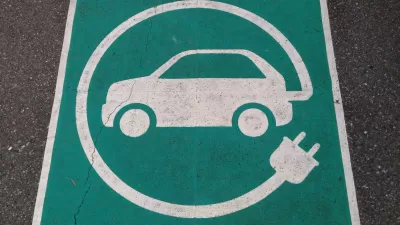According to a new report from Climate Central, your EV is only as clean as the power plant used to generate the electricity it runs on. Furthermore, due to the huge carbon cost of batteries, a hybrid may be more climate-friendly than a plug-in.
Mike Lindblom, Seattle Times transportation reporter, presents the good news for his environmentally conscious readers who who want to buy all-electric vehicles (EVs) - that is, vehicles without gas tanks or tailpipes, based on the findings of Climate Central which describes itself as "(a)n independent organization of leading scientists and journalists researching and reporting the facts about our changing climate and its impact on the American public."
In Washington state, the best all-electric cars cause so little carbon pollution that it’s like getting 383 miles per gallon of fossil fuel, even if you take into account the energy it took to make the battery. This is because three-fourths of the state’s electric supply is generated by river dams.
Ditto if you live in the Green Mountain State:
The advantage in Washington state is second only to Vermont, which uses predominantly nuclear power, supplemented by hydro and other renewable energy sources. Idaho, Oregon and California are similar to Washington.
But those two states fall in the minority on account of the second question the report (PDF) from Climate Central poses:
- First, would the environmental damage of generating the electricity make a plug-in car dirtier than a car that uses gasoline?
- Second, would the carbon emitted in making the battery cancel the carbon savings from driving a plug-in car?
“One of the surprising things to us is how much the emissions to make the battery matter,” said Alyson Kenward, a senior scientist and co-author. Battery manufacturing emits 10,000 to 40,000 pounds of carbon per battery and electrical components.
Translation: "In Washington state you would have to drive a plug-in Honda Fit (if you can find one) 20,430 miles to overcome the initial “carbon debt,” compared to driving a gasoline-hybrid Toyota Prius, (Kenward) said.
In fact, in all but 17 states, "a gasoline-hybrid Toyota Prius is more benign than an all electric Nissan Leaf, even after 100,000 miles on the road", writes Lindblom. [The interactive map allows you to click on any state to see the top 10 most climate-friendly cars, depending on how many miles the car is driven].
Climate Central's report is similar to an earlier report by the Union of Concerned Scientists posted here on April 18, 2012, but goes further by analyzing the carbon costs of building the battery packs, not just charging them.
For a different assessment of the carbon costs of EVs, see NRDC Switchboard: Max Baumhefner’s Blog - "Electric Cars Are Cleaner Today and Will Only Get Cleaner Tomorrow" that supports the findings that "from cradle to grave, electric cars are the cleanest vehicles on the road today".
On a related note, a New York Times Sunday Review editorial reported on August 11 that "(a)utomakers sold more than 350,000 hybrid and electric cars in the first seven months of this year, up 30 percent from the same period in 2012", though noting that "(f)ully electric cars are still a niche product bought mostly by affluent drivers".
It did not distinguish between all-electrics, plug-in hybrid electrics, e.g. Chevrolet Volt, and conventional hybrids as the Climate Central report does. Rather, it calls purchases of all these vehicles "a welcome development for the planet".
FULL STORY: Electric cars not cleanest option for some states, report says

Alabama: Trump Terminates Settlements for Black Communities Harmed By Raw Sewage
Trump deemed the landmark civil rights agreement “illegal DEI and environmental justice policy.”

Planetizen Federal Action Tracker
A weekly monitor of how Trump’s orders and actions are impacting planners and planning in America.

The 120 Year Old Tiny Home Villages That Sheltered San Francisco’s Earthquake Refugees
More than a century ago, San Francisco mobilized to house thousands of residents displaced by the 1906 earthquake. Could their strategy offer a model for the present?

In Both Crashes and Crime, Public Transportation is Far Safer than Driving
Contrary to popular assumptions, public transportation has far lower crash and crime rates than automobile travel. For safer communities, improve and encourage transit travel.

Report: Zoning Reforms Should Complement Nashville’s Ambitious Transit Plan
Without reform, restrictive zoning codes will limit the impact of the city’s planned transit expansion and could exclude some of the residents who depend on transit the most.

Judge Orders Release of Frozen IRA, IIJA Funding
The decision is a victory for environmental groups who charged that freezing funds for critical infrastructure and disaster response programs caused “real and irreparable harm” to communities.
Urban Design for Planners 1: Software Tools
This six-course series explores essential urban design concepts using open source software and equips planners with the tools they need to participate fully in the urban design process.
Planning for Universal Design
Learn the tools for implementing Universal Design in planning regulations.
Clanton & Associates, Inc.
Jessamine County Fiscal Court
Institute for Housing and Urban Development Studies (IHS)
City of Grandview
Harvard GSD Executive Education
Toledo-Lucas County Plan Commissions
Salt Lake City
NYU Wagner Graduate School of Public Service



























